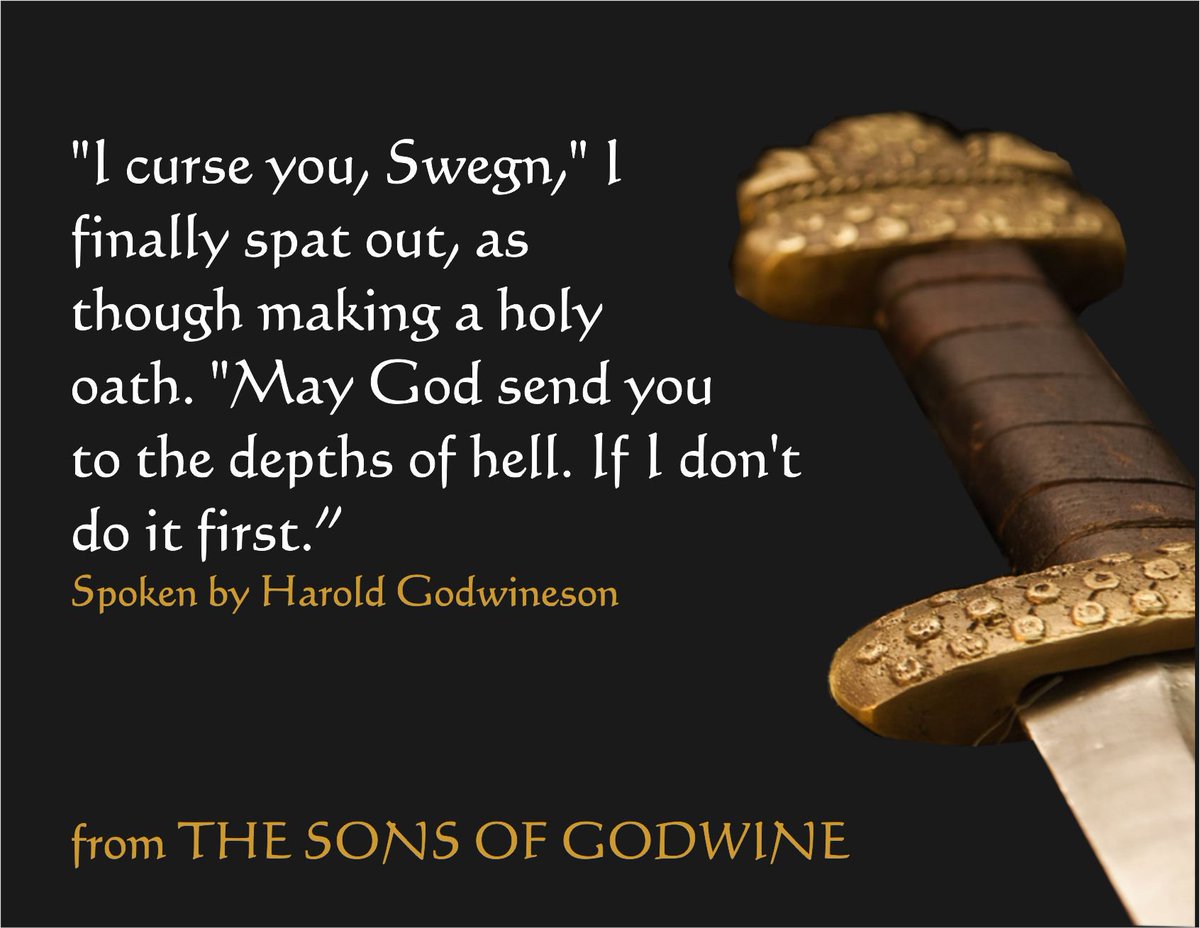
Author: Mercedes Rochelle
Narrator: Kevin E. Green
Length: 10 hours 25 minutes
Series: The Last Great Saxon Earls, Book 2
Publisher: Mercedes Rochelle
Release date: June 11, 2020
Genre: Historical Fiction

Emerging from the long shadow cast by his formidable father, Harold Godwineson showed himself to be a worthy successor to the Earldom of Wessex. In the following 12 years, he became the king's most trusted advisor, practically taking the reins of government into his own hands. And on Edward the Confessor's death, Harold Godwineson mounted the throne - the first king of England not of royal blood. Yet Harold was only a man, and his rise in fortune was not blameless. Like any person aspiring to power, he made choices he wasn't particularly proud of. Unfortunately, those closest to him, sometimes, paid the price of his fame. This is a story of Godwine's family as told from the viewpoint of Harold and his younger brothers. Queen Editha, known for her Vita Ædwardi Regis, originally commissioned a work to memorialize the deeds of her family, but after the Conquest historians tell us she abandoned this project. In The Sons of Godwine and Fatal Rivalry, I am telling the story as it might have survived, had she collected and passed on the memoirs of her tragic brothers. Harold's siblings were all overshadowed by their famous brother; and in their memoirs, we see remarks tinged sometimes with admiration, sometimes with skepticism, and in Tostig's case, with jealousy. We see a Harold who is ambitious, self-assured, sometimes egocentric, imperfect, yet heroic. His own story is all about Harold, but his brothers see things a little differently. Throughout, their observations are purely subjective, and witnessing events through their eyes gives us an insider’s perspective. Harold was his mother's favorite, confident enough to rise above petty sibling rivalry, but Tostig, next in line, was not so lucky. Harold would have been surprised by Tostig's vindictiveness, if he had ever given his brother a second thought. And that was the problem. Tostig's love/hate relationship with Harold would eventually destroy everything they worked for, leaving the country open to foreign conquest.
https://youtu.be/xuTwrK2ZrI0

Mercedes Rochelle is an ardent lover of medieval history, and has channeled this interest into fiction writing. She believes that good Historical Fiction, or Faction as it’s coming to be known, is an excellent way to introduce the subject to curious readers. Her first four books cover eleventh-century Britain and events surrounding the Norman Conquest of England. The next series is called The Plantagenet Legacy about the struggles and abdication of Richard II, leading to the troubled reigns of the Lancastrian Kings. She also writes a blog: HistoricalBritainBlog.com to explore the history behind the story. Born in St. Louis, MO, she received by BA in Literature at the Univ. of Missouri St.Louis in 1979 then moved to New York in 1982 while in her mid-20s to “see the world”. The search hasn’t ended! Today she lives in Sergeantsville, NJ with her husband in a log home they had built themselves.
I have been narrating audiobooks for nearly 10 years, and have recorded over 80 full length books. I first started 'narrating' books when reading to my two young sons at bedtime, and I read the complete Lord of the Rings to each of them -including character voices! I have many years acting experience, and I have my own recording studio where I record and master my own recordings. I love narrating books for a living and enjoy all genres, fiction and non-fiction alike.


Q&A with Author Mercedes Rochelle
- Could you tell me a little about yourself?
- Thanks for asking. Ironically, I wasn't interested in history until my college days. I joined a reenactment group (SCA - Society for Creative Anachronism) and learned about living history by "doing". I was hooked, and suddenly saw an application for my love of writing. Shakespeare has always been my inspiration, and my favorite play Macbeth was about a real king who lived in the 11th century. My first novel HEIR TO A PROPHECY follows the story of Banquo and Fleance and the witches' prophecy. The research led me backwards to Earl Godwine and his sons, and I like to call GODWINE KINGMAKER a prequel, though the trilogy actually overlaps HEIR.
- Why did you choose to write Historical Fiction?
- You know, I was reading and enjoying historical fiction before I even knew it was a genre. It all started when I specialized in the 19th century novel during my college years. I think the first time I had an inkling about historical fiction was while reading "The Hunchback of Notre Dame". Medieval France came to life. Then I read "The Three Musketeers" and I was truly smitten. I still am. By the time I started writing my first novel, I still wasn't aware I was writing in any kind of genre; I don't remember referring to historical fiction as such in college. I still don't know when it sunk in!
- Is it important for writers to tap into the emotions of the characters?
- Tapping into the emotions of characters is vital, I think, but also difficult for me unless the scene itself is emotional. Some emotions are easy: greed, anger, and fear are at the end of the spectrum, so to speak, and drive the action. More subtle emotions such as loss, satisfaction, and ambivalence are challenging. On one occasion, when my character was being abandoned (again) and felt sorry for himself, I was in tears as I was writing. That is an accomplishment! Alas, it only happened to me once but it was sublime. I assumed this emotion came across; at least I hope so.
- Have you ever used yourself as a character for the starting point of a story?
- Interesting. I have to admit that I saw myself in Tostig, in THE SONS OF GODWINE. When they were boys, Tostig admired and tried to emulate his older brother Harold but was rebuffed too many times, leading to resentment and eventually rivalry. I could "feel his pain", because I adored my older brother who always saw me as a pest. I could relate to Tostig, though I never took my hurt feelings as far as he did!
- Are you a plotter, a pantster, or a hybrid?
- Funny you should ask! Just last night I was reading Stephen King's "On Writing", and here's what he said about plotting: "I distrust plot for two reasons: first, because our lives are largely plotless...and second, because I believe plotting and the spontaneity of real creation aren't compatible." Spot on! If I had to rely on plots and outlines, I'd never get a story off the ground. I see writing as a bit of a miracle; there are times I am in a real pickle, so to speak, and I must rely on my characters to solve their own difficulties. Often, I don't know what is going to happen until I write it. You know, it almost always works for me.
- What is the biggest obstacle you face in writing?
- For me, personally, my biggest obstacle is getting the details right. There are so many ways to screw up, and guaranteed there is at least one critic out there who can't wait to jump on inaccuracies. For instance, I was "called on the carpet" because I had Canute and Godwine eating a rabbit while camping in the woods. The reviewer stated scornfully that the Normans brought rabbits to England. Imagine that! Now, as an author it's bad form to respond to reviews, and frankly I didn't know whether he was right or wrong. Luckily, a trip to Google told me there was record of a Roman menu mentioning rabbit, so they might have brought them over. Whew. Did I know that ahead of time? No. I admit it. It never occurred to me. An error like that can kill the story for a reader. The devil is in the details!
- Do movies help you write?
- Personally, I get a tremendous value from movies. Many of my characters are modeled after an actor in a movie—not necessarily the actor per se, but his own character. Here's a secret: I modeled Canute after Pierce Brosnan in Noble House—NOT James Bond, mind you. This mini-series was made back in 1988, which shows you how long I was thinking about him. There was something so sharp—so unscrupulous in those deep blue eyes that he totally captured my imagination. An actor in a movie gives us so many subtleties that translate well to paper. I don't choose them; they choose me. Some of my favorite actors haven't found their way into my books (yet).
- Did you have a favorite book as a child? Which of your books is your favorite, and why?
- Your question brings me back to the first books that moved me as a kid. I absolutely loved the Black Stallion series and Lad, A Dog. Obviously I was into animal stories. I even had a poster of Man O'War (the horse!) because of the Walter Farley book of that name. Most girls had posters of teenage heart throbs! I should go back and check him out. To this day, my all-time favorite book is The Three Musketeers by Alexandre Dumas. I even learned French to read it in its original language. It was the nineteenth-century novel that introduced me to the concept of historical fiction, and I don't think I've ever seen it done better since.
- How do you feel about villains?
- Everybody loves a good villain! I truly believe that there is no totally good person, nor is there a totally bad person. How many times have we read that a killer's mother said he was such a good boy? I like the challenge of balancing out both extremes, which you will discover when you get to THE SONS OF GODWINE and FATAL RIVALRY. In HEIR, we really don't have any juicy villains (unless you cast William the Conqueror in that role), but we do have a lot of characters who are a bit tarnished around the edges. That's the way I like it.
- Have you ever had your characters take over a story?
- Because history writes my plot, I don't do much swerving from the story line. But I do sometimes get caught up in my characters' motivations, that change as I get to know them better. By the second draft, I sometimes realize that this character wouldn't act that way and I have to change his behavior to fit his fuller profile. Sometimes I end up feeling more charitable toward a character that I originally didn't like. John of Gaunt is a perfect example. He was an arrogant, aristocratic man who always insisted on getting his way, but I came to realize that he was impeccably loyal to the crown and trustworthy to a fault.
- Do you struggle with writer's block, if so, how do you overcome it?
- I think that Writer's Block is just an excuse for procrastination. We all do it. I used to beat myself up when I thought I had writer's block, but then I realized that I just preferred to do something else! Like gardening. Like social media (marketing). Like housecleaning (ok, that's a stretch). Sometimes I'd let a week go by without touching my manuscript. I mean, really, who cares if I write or not? If it doesn't get written today, it might get written tomorrow. Once in a while, when I'm really stuck, I'll just make myself a note in the manuscript and skip forward to the next chapter. I'll come back to it in the next draft when I'm better prepared to face whatever's bugging me. And not concerning myself about it is, in a way, the best way to beat it. If it's not a problem, then no need to turn it into one.
- In historical fiction, how much can you stretch the truth?
- My favorite question! I think it's something we struggle with every day. How many of us would stick up our noses at Errol Flynn's Robin Hood? We know it's total rubbish, but who cares? It's such a great story. Of course, good storytelling is the crux of the matter. I think an author can get away with stretching the truth —to an extent—if the story is entertaining enough. I don't mean putting characters in the wrong period (unless it's a time travel) or falsifying the outcome of a battle. But I don't have a problem incorporating a legend into a story, if it's been believed for hundreds of years (usually the legend is more interesting than the truth). Or putting the character in a country he probably wasn't visiting at that time (you can always explain in the author's note). Since we are writing fiction, the story comes first. To paraphrase Stephen King, your first job is to entertain someone who had a hard day at work and just wants to relax (see, I did remember something). There are always going to be nit-pickers out there who will castigate you for the wrong piece of clothing or an incorrect word. Forget about them! If your story is good enough, the average reader won't care.
- What qualities do you look for in a narrator for your books?
- That's such a good question! When accessing all the available narrators on Audible, I was originally quite overwhelmed. The easy part was gender, which naturally would match my protagonist. I wanted a voice with an English accent, since my novels took place in England. Then things got complicated! The most important quality to me was intonation; did the narrator emphasize certain words in a sentence that I wanted to hear emphasized—especially in the dialogue. (Since I chose the script, I could nitpick the important passages.) It only took a few words with the wrong modulation for me to eliminate competitors. Kevin gave me a bonus in that he used voices, like an actor, to give my characters life.

BOSHAM, HOME OF THE GODWINE CLAN
By Mercedes Rochelle
A visit to Bosham reveals a very pretty coastal town with firm connections to the Godwine clan. In an earlier post, I conjectured that Earl Godwine may have used Bosham as one of his main residences. It makes sense, since it is one of the only places in England actually drawn in the Bayeux Tapestry; Harold departed from Bosham before his fateful visit to Normandy.
The Holy Trinity church is said to date back to the 10th century on the site of a Roman Basilica, and there is a gravestone under the Anglo-Saxon arch marking the spot believed to hold the bones of an unnamed daughter of Canute who drowned in the millstream. There is no proof that the child’s skeleton belonged to Canute’s daughter, but the position of importance in the church combined with local legends makes a strong case. I find the Canute connection very interesting, since he and Godwine were close throughout Canute’s reign. It is thought that Canute actually had a residence in Bosham as well, and may have built it on the foundations of Emperor Vespasian’s palace; tradition has it that the Romans established an encampment there. Oh, and this is the place where Canute allegedly tried to Command the Tide, to demonstrate to his followers that even the king’s powers were limited compared to the supreme power of God.
Canute’s daughter’s marker (my photo)
Even more interesting, in 1954 an unmarked coffin was discovered under the floor stones, just a few feet from the royal princess. Although the skeleton was not intact, they did identify the “thigh and pelvic bones of a powerfully built man of about 5 ft 6 in. in height aged over 60 years with traces of arthritis” (see John Pollock, “Is King Harold II buried in Bosham Church?”). Its proximity to the princess denotes a person of importance, and local tradition has long believed that the bones belonged to Earl Godwine himself. However, the Anglo-Saxon Chronicle states that Godwine was buried in Winchester, and John Pollock believes that the bones could have belonged to Harold Godwineson. A headless one-legged skeleton would certainly be consistent with the condition of poor Harold after he was hacked to pieces at the Battle of Hastings! Also, it was said that William the Conqueror wanted to make sure that Harold’s resting place would not become a shrine, and he insisted that his conquered foe would be interred somewhere in secret. He even promised to bury him on the seashore, overlooking the land he tried to defend. Hence, the unmarked grave? Godwine’s manor was reportedly the only territory William took possession of in Sussex.
Although I couldn’t find a “Harold Slept Here” marker, it was clear that Bosham claimed him as one of their own, and were very proud of their heritage.


Click here to view the full tour schedule!
Plugging you into the audio community since 2016.









Comments
Post a Comment